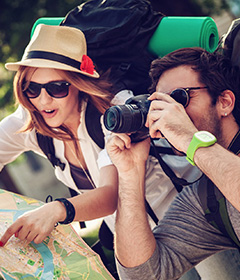Road trips embody the essence of freedom, offering unparalleled autonomy and adventure. The open road beckons with infinite possibilities, allowing travellers to chart their own course through diverse landscapes and cultures. This mode of exploration grants a level of independence unmatched by other forms of travel, empowering individuals to craft their journey on their own terms.
The allure of road trips lies in their ability to blend structure with spontaneity, affording travellers the flexibility to deviate from planned routes and embrace serendipitous discoveries. This unique form of travel not only provides a means of transportation but also serves as a catalyst for personal growth, cultural immersion, and a deeper connection with the world around us.
Automotive autonomy: vehicle customization for long-distance travel
The freedom of a road trip begins with the vehicle itself. Customizing one’s mode of transport for long-distance travel is an essential aspect of road trip preparation. This process allows travellers to create a mobile home tailored to their specific needs and preferences, enhancing comfort and functionality for extended journeys.
Vehicle customization can range from simple modifications to extensive overhauls. Practical additions might include roof racks for extra storage, window tinting for sun protection, or upgraded suspension systems for improved handling on diverse terrains. More elaborate customizations could involve converting vans or buses into fully-equipped campers, complete with sleeping quarters, kitchenettes, and off-grid power systems.
The ability to personalize one’s vehicle not only enhances the travel experience but also fosters a sense of ownership and connection to the journey. This level of customization is unique to road trips, offering a degree of control and comfort that is simply not possible with other modes of travel.
Navigational freedom: route planning and spontaneous detours
One of the most liberating aspects of road trips is the freedom to choose and alter one’s route at will. While some travellers prefer to meticulously plan their itinerary, others revel in the spontaneity of unplanned detours and discoveries. This flexibility allows for a truly personalized travel experience, adapting to changing circumstances, interests, or simply following one’s whims.
GPS technology and offline mapping for remote areas
Modern technology has revolutionized road trip navigation, offering tools that enhance both planning and spontaneity. GPS devices and smartphone apps provide real-time directions and traffic updates, while offline mapping capabilities ensure navigation even in remote areas without cellular coverage.
These technological advancements have significantly reduced the stress associated with navigation, allowing travellers to focus on the journey itself rather than worrying about getting lost. However, it’s important to maintain a balance between relying on technology and honing traditional map-reading skills, as electronic devices can fail or lose signal in certain areas.
Crowdsourced navigation apps: waze and community-driven updates
Crowdsourced navigation apps like Waze have added a new dimension to road trip planning. These platforms leverage real-time data from users to provide up-to-date information on traffic conditions, road closures, and points of interest. This community-driven approach to navigation allows road trippers to benefit from the collective knowledge and experiences of fellow travellers.
The social aspect of these apps also fosters a sense of community among road trippers, with users sharing tips, warnings, and recommendations. This collaborative environment enhances the overall travel experience, making it easier to discover hidden gems and avoid potential pitfalls along the way.
Integrating historical routes: following the oregon trail or route 66
For those seeking a blend of adventure and historical significance, integrating famous historical routes into a road trip can add depth and context to the journey. Following iconic paths like the Oregon Trail or Route 66 allows travellers to retrace the steps of pioneers and experience the evolution of American culture and landscape firsthand.
These historical routes often pass through small towns and forgotten landmarks, offering a glimpse into the past and a chance to explore off-the-beaten-path destinations. Integrating these routes into a modern road trip creates a unique juxtaposition of past and present, enriching the travel experience with layers of history and cultural significance.
Balancing itinerary structure with impromptu exploration
The art of a successful road trip lies in striking the right balance between structured planning and spontaneous exploration. While having a general itinerary can provide direction and ensure that key destinations are visited, leaving room for impromptu detours and discoveries is equally important.
This balance allows travellers to enjoy the security of a planned route while remaining open to unexpected opportunities. It might mean scheduling free days between planned stops or setting aside time each day for unplanned exploration. The key is to maintain flexibility, allowing the journey to unfold naturally while still having a framework to guide the overall trip.
Cultural immersion: authentic local experiences beyond tourist traps
Road trips offer unparalleled opportunities for cultural immersion, allowing travellers to venture beyond tourist hotspots and experience authentic local culture. This level of engagement with diverse communities and lifestyles is a fundamental aspect of the freedom that road trips provide.
By travelling at a slower pace and having the flexibility to stop in small towns and rural areas, road trippers can interact with locals in more meaningful ways. This might involve sampling regional cuisines at local diners, attending community events, or simply engaging in conversations with residents at local gathering spots.
These authentic interactions provide insights into local customs, traditions, and ways of life that are often missed by travellers restricted to more conventional tourist routes. The freedom to linger in a place, change plans based on local recommendations, or stumble upon unexpected cultural experiences is a unique advantage of road trip travel.
Temporal liberty: flexible scheduling and extended stays
The freedom of time management is another significant advantage of road trips. Unlike other forms of travel that often adhere to strict schedules, road trips allow for flexible timing and the ability to extend stays at will. This temporal liberty enables travellers to fully immerse themselves in destinations that resonate with them, without the pressure of rigid itineraries or departure times.
Workamping: blending remote work with nomadic lifestyle
The rise of remote work has given birth to the concept of “workamping,” a lifestyle that combines work and camping. This approach allows individuals to embark on extended road trips while maintaining their professional commitments. Workampers might stay at campgrounds or RV parks that offer amenities like Wi-Fi and workspace, enabling them to work during the day and explore in their free time.
This blending of work and travel represents a new frontier in the concept of freedom, allowing individuals to break free from traditional office-based work environments and experience long-term travel without sacrificing their careers. Workamping exemplifies how road trips can facilitate a more flexible and liberated approach to both work and leisure.
Slow travel philosophy: depth over breadth in destination exploration
The slow travel philosophy aligns perfectly with the freedom offered by road trips. This approach emphasizes quality over quantity, encouraging travellers to spend more time in fewer places rather than rushing through a long list of destinations. By adopting this mindset, road trippers can develop a deeper connection with the places they visit, gaining a more nuanced understanding of local culture and lifestyle.
Slow travel allows for spontaneous experiences and unexpected discoveries that often become the most memorable aspects of a journey. It might involve spending several days exploring a small town, participating in local activities, or simply taking the time to observe and absorb the rhythm of daily life in a new place.
Seasonal considerations: timing road trips for optimal experiences
The freedom to choose when to travel is another advantage of road trips. Different seasons offer unique experiences and opportunities, and road trippers have the flexibility to time their journeys for optimal conditions. This might mean planning a trip to New England during the autumn to witness the spectacular fall foliage, or visiting the Southwest during the cooler winter months to avoid extreme summer temperatures.
Seasonal planning can also involve timing trips to coincide with specific events or natural phenomena, such as wildflower blooms, wildlife migrations, or cultural festivals. This level of timing precision is often difficult to achieve with other forms of travel, making it a unique aspect of the freedom afforded by road trips.
Economic independence: budget control and cost-effective travel
Road trips offer a high degree of economic freedom, allowing travellers to have greater control over their budget and expenses. Unlike package tours or flights, which often come with fixed costs, road trips provide the flexibility to adjust spending based on personal preferences and financial constraints.
Travellers can choose between luxury accommodations and budget-friendly camping, opt for home-cooked meals over restaurant dining, and adjust their itinerary to focus on free or low-cost activities. This economic flexibility makes road trips accessible to a wide range of budgets and allows for longer periods of travel by stretching resources further.
The ability to control costs without sacrificing the quality of experiences is a significant factor in why many consider road trips to be the ultimate expression of travel freedom. It empowers individuals to make informed decisions about where and how to allocate their travel funds, resulting in a more personalized and satisfying journey.
Environmental engagement: eco-friendly road tripping practices
While road trips have traditionally been associated with fuel consumption and carbon emissions, there is a growing trend towards more environmentally conscious road tripping. This shift reflects a desire to maintain the freedom of road travel while minimizing negative impacts on the environment.
Electric vehicle road trips: planning around charging infrastructure
The rise of electric vehicles (EVs) has opened up new possibilities for eco-friendly road trips. Planning a road trip in an EV requires careful consideration of charging infrastructure, but it also offers the freedom to travel with a significantly reduced carbon footprint. Many EV owners report that the need to plan around charging stops adds an exciting element of strategy to their journeys.
As charging networks continue to expand, EV road trips are becoming increasingly feasible and popular. This shift towards electric mobility represents a new kind of freedom – the ability to explore without the guilt of excessive environmental impact.
Carbon offsetting strategies for fuel-based journeys
For those traveling in traditional fuel-based vehicles, carbon offsetting strategies offer a way to mitigate environmental impact. These might include purchasing carbon credits, supporting reforestation projects, or investing in renewable energy initiatives to counterbalance the emissions produced during the trip.
While not a perfect solution, carbon offsetting allows environmentally conscious road trippers to take responsibility for their impact while still enjoying the freedom of the open road. It’s a proactive approach that aligns the desire for travel with environmental stewardship.
Leave no trace principles applied to roadside camping
The freedom to camp in diverse locations is a cherished aspect of road trips, but it comes with the responsibility to preserve natural environments. Applying Leave No Trace principles to roadside camping ensures that the freedom to explore wild places is balanced with environmental protection.
These principles include packing out all waste, minimizing campfire impacts, respecting wildlife, and leaving natural and cultural artifacts undisturbed. By adhering to these guidelines, road trippers can enjoy the freedom of wild camping while ensuring that these spaces remain pristine for future travelers.
Supporting local conservation efforts along travel routes
Road trips offer unique opportunities to engage with and support local conservation efforts along travel routes. This might involve volunteering for trail maintenance projects, participating in beach clean-ups, or contributing to local environmental organizations.
Engaging in these activities not only helps protect the environments that road trippers enjoy but also provides a deeper sense of connection to the places visited. It transforms the road trip from a passive journey into an active form of environmental stewardship, adding another layer of meaning and purpose to the travel experience.
The freedom to choose how and where to make a positive impact is yet another expression of the autonomy that road trips provide. By combining exploration with conservation, road trippers can enjoy the ultimate freedom of travel while also contributing to the preservation of the natural world they’ve set out to discover.


